| Listing 1 - 9 of 9 |
Sort by
|
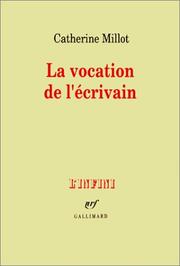
ISBN: 2070722430 9782070722433 Year: 1991 Publisher: Paris: Gallimard,
Abstract | Keywords | Export | Availability | Bookmark
 Loading...
Loading...Choose an application
- Reference Manager
- EndNote
- RefWorks (Direct export to RefWorks)
Authors --- Authorship --- Ecrivains --- Art d'écrire --- Psychology --- Psychological aspects --- Psychologie --- Aspect psychologique --- Art d'écrire --- Psychanalyse et littérature --- Authors - Psychology --- Authorship - Psychological aspects
Book
ISBN: 041590711X Year: 1993 Publisher: New York Routledge
Abstract | Keywords | Export | Availability | Bookmark
 Loading...
Loading...Choose an application
- Reference Manager
- EndNote
- RefWorks (Direct export to RefWorks)
82:396 --- Literatuur en feminisme --- 82:396 Literatuur en feminisme --- Creation (Literary, artistic, etc.) --- Women authors --- Authors, Women --- Female authors --- Women as authors --- Authors --- Women and literature --- Psychological aspects --- Mental health --- Psychology --- Women authors - Mental health. --- Women authors - Psychology. --- Creation (Literary, artistic, etc.) - Psychological aspects.
Book
ISBN: 3476015971 9783476015976 Year: 1998 Volume: Bd. 48 Publisher: Stuttgart: J. B. Metzler,
Abstract | Keywords | Export | Availability | Bookmark
 Loading...
Loading...Choose an application
- Reference Manager
- EndNote
- RefWorks (Direct export to RefWorks)
German literature --- Women authors --- Authorship. --- Littérature allemande --- Ecrivaines --- Art d'écrire --- History and criticism. --- Psychology --- Histoire et critique --- Psychologie --- Authorship --- History and criticism --- Littérature allemande --- Art d'écrire --- German literature - 20th century - History and criticism --- Women authors - Psychology --- German literature - Women authors - History and criticism
Book
ISBN: 2717837337 9782717837339 Year: 1998 Publisher: Paris: Anthropos,
Abstract | Keywords | Export | Availability | Bookmark
 Loading...
Loading...Choose an application
- Reference Manager
- EndNote
- RefWorks (Direct export to RefWorks)
Psychoanalysis and literature --- Psychanalyse et littérature --- Psychic trauma. --- Psychoanalysis and literature. --- Authors --- Psychology. --- 82:159.9 --- 82-94 --- Literatuur en psychologie. Literatuur en psychoanalyse --- Dagboek. Memoires. Autobiografie --- Psychoanalyse --- klinische beschouwingen --- klinische beschouwingen. --- 82:159.9 Literatuur en psychologie. Literatuur en psychoanalyse --- 82-94 Dagboek. Memoires. Autobiografie --- Psychanalyse et littérature --- Authors - Psychology.
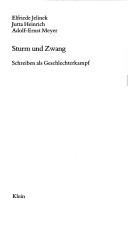
ISBN: 3895210250 9783895210259 Year: 1995 Publisher: Hamburg: Klein,
Abstract | Keywords | Export | Availability | Bookmark
 Loading...
Loading...Choose an application
- Reference Manager
- EndNote
- RefWorks (Direct export to RefWorks)
Heinrich, Jutta --- Jelinek, Elfriede --- Women in literature --- Women authors --- Authors, German --- Women authors, German --- German literature --- Psychology --- Interviews --- History and criticism --- Jelinek, Elfriede, --- Authors, German. --- Geschlechterkonflikt. --- Interview. --- Schriftstellerin. --- Selbstverständnis. --- Women and literature --- Women and literature. --- Women authors, German. --- Women in literature. --- History and criticism. --- Women authors. --- History --- Psychology. --- Heinrich, Jutta, --- Heinrich, Jutta. --- Jelinek, Elfriede. --- 1900-1999. --- Germany. --- Women authors - Psychology --- Authors, German - 20th century - Interviews --- Women authors, German - Interviews --- German literature - Women authors - History and criticism --- Jelinek, Elfriede, - 1946- - Interviews --- Heinrich, Jutta - Interviews --- Jelinek, Elfriede, - 1946 --- -Heinrich, Jutta --- Jelinek, Elfriede, 1946
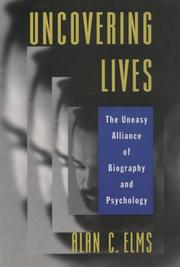
ISBN: 0195082877 0585332134 9780585332130 128045394X 9781280453946 9786610453948 6610453942 0195113799 9780195113792 9780195082876 9780195354331 0195354338 160256194X Year: 1994 Publisher: Oxford : Oxford university press,
Abstract | Keywords | Export | Availability | Bookmark
 Loading...
Loading...Choose an application
- Reference Manager
- EndNote
- RefWorks (Direct export to RefWorks)
This work argues that psychobiography can rival traditional biography in the insights it offers. Elms makes a case for the value of psychobiography, arguing in part from his own case studies of over a dozen prominent figures. It also offers tips for anyone interested in writing in this genre.
Non-fiction --- Psychological study of literature --- Biografie als literair genre --- Biografie--Geschiedenis en kritiek --- Biografie--Techniek --- Biographie (Genre littéraire) --- Biographie--Histoire et critique --- Biographie--Technique --- Biography [Writing of ] --- Biography as a literary form --- Biography--History and criticism --- Biography--Technique --- Authors --- Biography as a literary form. --- Politicians --- Psychologists --- Psychology --- Case studies. --- Biographical methods. --- Biographical methods --- Case studies --- Psychology - Biographical methods. --- Psychologists - Psychology - Case studies. --- Politicians - Psychology - Case studies. --- Authors - Psychology - Case studies. --- Biographical methods in psychology --- Biography in psychology --- Biography --- Writers --- Litterateurs --- Bio-bibliography --- Literature --- Statesmen --- Behavioral scientists --- Authorship --- Prose literature --- History and criticism --- Technique
Book
ISBN: 2082103625 9782082103626 Year: 2004 Publisher: Paris: Flammarion,
Abstract | Keywords | Export | Availability | Bookmark
 Loading...
Loading...Choose an application
- Reference Manager
- EndNote
- RefWorks (Direct export to RefWorks)
Notre corps ne ment jamais. Quand nous tombons malades, quand nous faisons l'expérience de la dépression, de la toxicomanie, de l'anorexie, c'est que nous sommes traversés par un conflit intérieur entre ce que nous ressentons et ce que nous voudrions ressentir. D'un côté, il y a notre corps, qui garde intacte la mémoire de notre histoire - et tout particulièrement des mauvais traitements que nos parents ont pu nous infliger -, de l'autre, il y a notre esprit et notre volonté, conditionnés par la morale et notre éducation, qui nous déterminent à aimer et honorer, quoi qu'il arrive, ces mêmes parents. Ce livre explore, à travers de nombreux exemples - notamment des vies d'écrivains célèbres -, les conséquences parfois dramatiques de ce conflit, mais il montre aussi qu'il existe des raisons d'espérer. Non, nous ne sommes pas obligés d'être les "bons" enfants de nos parents s'ils nous ont fait du mal et s'ils continuent de pratiquer le chantage affectif. Oui, c'est notre responsabilité que d'être attentifs aux signaux d'alerte que nous envoie notre corps. Au terme de ce chemin exigeant par lequel nous acceptons de relire l'histoire de nos rapports avec nos parents, il y a l'espoir de naître à une authentique liberté intérieure.
Mind and body --- Medicine, Psychosomatic --- Psychological manifestations of general diseases --- Family violence --- Parent and child --- Medicine in literature --- Psychoanalysis and literature --- Esprit et corps --- Médecine psychosomatique --- Manifestations psychologiques des maladies --- Violence familiale --- Parents et enfants --- Médecine dans la littérature --- Psychanalyse et littérature --- Psychological aspects --- Aspect psychologique --- Child abuse --- Discipline of children --- Parenting --- Adult child abuse victims --- Abused children --- Authors --- Mental health --- Psychology --- Médecine psychosomatique --- Médecine dans la littérature --- Psychanalyse et littérature --- Psychoanalysis --- Child abuse - Psychological aspects --- Family violence - Psychological aspects --- Discipline of children - Psychological aspects --- Parenting - Psychological aspects --- Adult child abuse victims - Mental health --- Abused children - Mental health --- Authors - Psychology
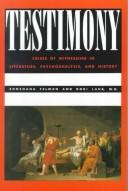
ISBN: 9780415903929 0415903920 0415903912 9780203700327 9781135206031 9781135205980 9781135206024 9780415903912 1306047978 1135206023 0203700325 1135206031 Year: 1992 Publisher: New York: Routledge,
Abstract | Keywords | Export | Availability | Bookmark
 Loading...
Loading...Choose an application
- Reference Manager
- EndNote
- RefWorks (Direct export to RefWorks)
"To write poetry after Auschwitz is barbaric," wrote Austrian musicologist Theodor Adorno. Indeed, the damage done to our sense of beauty, our sense of history and proportion by the events of World War II is profound. Traditional means of assessing and narrating human experience have failed to encompass and account for that historic trauma, and yet it is necessary to speak about these events if we are to heal their rupture of history. But how can we tell these stories? What are the historic consequence of testifying to such trauma? In this collaborative work, Yale literary critic Shoshana Felman and psychoanalyst Dori Laub examine the nature and function of testimony, witnessing and memory, both in their general relation to the acts of writing and of reading, and in their particular relation to the Holocaust. Defining, for the first time, the uniquely devastating aspect of the Holocaust as a radical crisis of witnessing, the "unprecedented historical occurrence of...an event eliminating its own witness", the authors examine the crisis of history and literature it has prompted, focusing on the henceforth modified relation between knowledge and event, literature and evidence, speech and survival, witnessing and ethics.Felman and Laub draw on their personal experiences receiving survivors' accounts to present the first "theory of testimony": a radically new conception of the relationship between art and culture and the witnessing of historical events. This new perspective on the meaning of testimony will be of vital interest to literary critics, film critics, psychotherapists, historians, philosophers, and lawyers.
Psychoanalysis and literature --- Authors --- Psychic trauma --- Holocaust, Jewish (1939-1945), in literature --- Psychology --- Shoah --- Survivants de la Shoah --- Psychanalyse et littérature --- Traumatisme psychique --- Écrivains --- Dans la littérature --- Aspect psychologique --- Psychologie --- Psychoanalyse en letterkunde --- Psychotrauma --- Psychoanalyse en letterkunde. --- Psychotrauma. --- Thematology --- Psychological study of literature --- Literature and psychoanalysis --- Psychoanalytic literary criticism --- Literature --- Emotional trauma --- Injuries, Psychic --- Psychic injuries --- Trauma, Emotional --- Trauma, Psychic --- Psychology, Pathological --- Psychic trauma. --- Psychoanalysis and literature. --- Psychology. --- Survivants de la Shoah. --- Psychanalyse et littérature. --- Traumatisme psychique. --- Dans la littérature. --- Aspect psychologique. --- Psychologie. --- Authors - Psychology
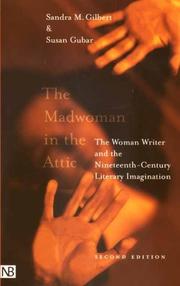
ISBN: 9780300084580 0300084587 Year: 2000 Publisher: New Haven (Conn.): Yale university press,
Abstract | Keywords | Export | Availability | Bookmark
 Loading...
Loading...Choose an application
- Reference Manager
- EndNote
- RefWorks (Direct export to RefWorks)
Littérature anglaise --- --Littérature féminine --- --XIXe s., --- Austen, Jane, --- Brontë, Charlotte (1816-1855) --- --Eliot, George, --- English literature --- Women and literature --- Women authors --- Women in literature --- History and criticism --- History --- Psychological aspects --- Psychology --- Women in literature. --- Woman (Christian theology) in literature --- Women in drama --- Women in poetry --- Authors, Women --- Female authors --- Women as authors --- Authors --- History and criticism. --- Psychological aspects. --- Psychology. --- British literature --- Inklings (Group of writers) --- Nonsense Club (Group of writers) --- Order of the Fancy (Group of writers) --- Women authors&delete& --- Littérature féminine --- XIXe s., 1801-1900 --- English literature - Women authors - History and criticism --- Women and literature - Great Britain - History - 19th century --- English literature - 19th century - History and criticism --- English literature - Psychological aspects --- Women authors - Psychology --- Austen, Jane, 1775-1817 --- Eliot, George, 1819-1880 --- LITTERATURE ANGLAISE --- FEMMES ET LITTERATURE --- FEMMES ECRIVAINS --- FEMMES DANS LA LITTERATURE --- HISTOIRE ET CRITIQUE --- GRANDE-BRETAGNE --- 19E SIECLE --- ASPECT PSYCHOLOGIQUE --- PSYCHOLOGIE
| Listing 1 - 9 of 9 |
Sort by
|

 Search
Search Feedback
Feedback About UniCat
About UniCat  Help
Help News
News